最新情态动词专项练习及答案详解
英语情态动词含答案解析
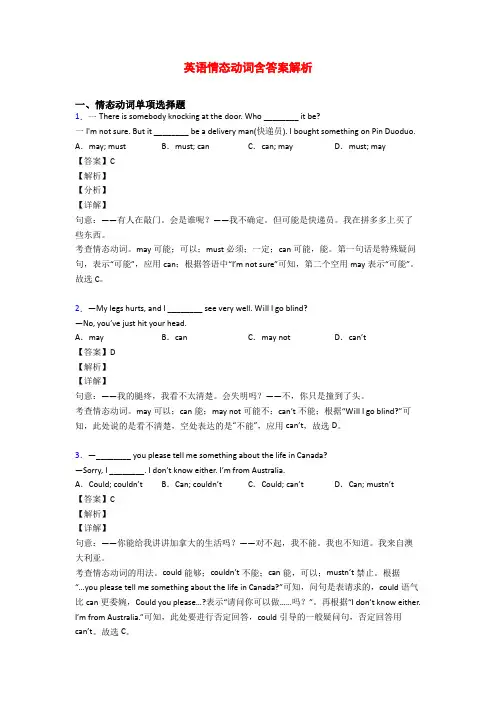
英语情态动词含答案解析一、情态动词单项选择题1.一There is somebody knocking at the door. Who ________ it be?一I'm not sure. But it ________ be a delivery man(快递员). I bought something on Pin Duoduo. A.may; must B.must; can C.can; may D.must; may【答案】C【解析】【分析】【详解】句意:——有人在敲门。
会是谁呢?——我不确定。
但可能是快递员。
我在拼多多上买了些东西。
考查情态动词。
may可能;可以;must必须;一定;can可能,能。
第一句话是特殊疑问句,表示“可能”,应用can;根据答语中“I’m not sure”可知,第二个空用may表示“可能”。
故选C。
2.—My legs hurts, and I ________ see very well. Will I go blind?—No, you’ve just hit your head.A.may B.can C.may not D.can’t【答案】D【解析】【详解】句意:——我的腿疼,我看不太清楚。
会失明吗?——不,你只是撞到了头。
考查情态动词。
may可以;can能;may not可能不;can’t不能;根据“Will I go blind?”可知,此处说的是看不清楚,空处表达的是“不能”,应用can’t,故选D。
3.—________ you please tell me something about the life in Canada?—Sorry, I ________. I don’t know either. I’m from Australia.A.Could; couldn’t B.Can; couldn’t C.Could; can’t D.Can; mustn’t【答案】C【解析】【详解】句意:——你能给我讲讲加拿大的生活吗?——对不起,我不能。
高考情态动词专项练习题及答案详解
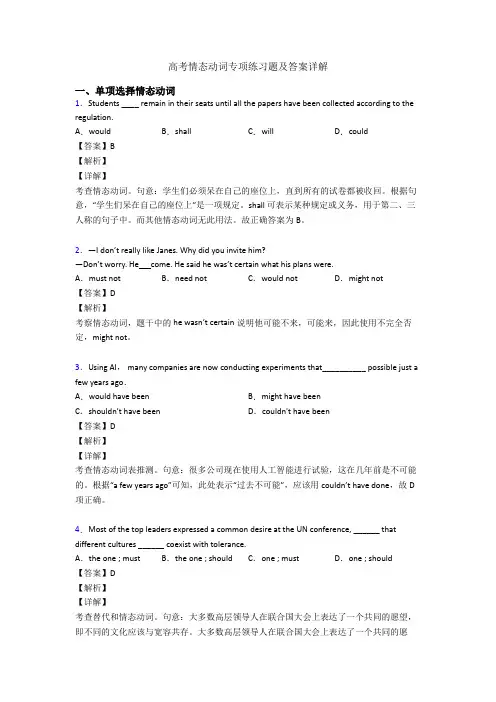
高考情态动词专项练习题及答案详解一、单项选择情态动词1.Students ____ remain in their seats until all the papers have been collected according to the regulation.A.would B.shall C.will D.could【答案】B【解析】【详解】考查情态动词。
句意:学生们必须呆在自己的座位上,直到所有的试卷都被收回。
根据句意,“学生们呆在自己的座位上”是一项规定。
shall 可表示某种规定或义务,用于第二、三人称的句子中。
而其他情态动词无此用法。
故正确答案为B。
2.—I don’t really like Janes. Why did you invite him?—Don’t worry. He come. He said he was’t certain what his plans were.A.must not B.need not C.would not D.might not【答案】D【解析】考察情态动词,题干中的he wasn’t certain说明他可能不来,可能来,因此使用不完全否定,might not。
3.Using AI, many companies are now conducting experiments that__________ possible just a few years ago.A.would have been B.might have beenC.shouldn't have been D.couldn't have been【答案】D【解析】【详解】考查情态动词表推测。
句意:很多公司现在使用人工智能进行试验,这在几年前是不可能的。
根据“a few years ago”可知,此处表示“过去不可能”,应该用couldn’t have done,故D 项正确。
高考英语最新情态动词知识点专项训练及解析答案
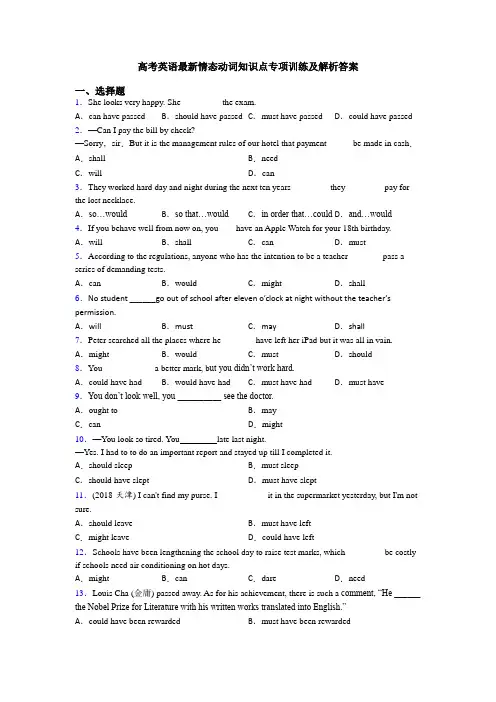
高考英语最新情态动词知识点专项训练及解析答案一、选择题1.She looks very happy. She_________ the exam.A.can have passed B.should have passed C.must have passed D.could have passed 2.—Can I pay the bill by check?—Sorry,sir.But it is the management rules of our hotel that payment _____ be made in cash.A.shall B.needC.will D.can3.They worked hard day and night during the next ten years ________ they ________ pay for the lost necklace.A.so…would B.so that…would C.in order that…could D.and…would4.If you behave well from now on, you ___ have an Apple Watch for your 18th birthday. A.will B.shall C.can D.must 5.According to the regulations, anyone who has the intention to be a teacher _______ pass a series of demanding tests.A.can B.would C.might D.shall6.No student ______go out of school after eleven o’clock at night without the teacher’s permission.A.will B.must C.may D.shall7.Peter searched all the places where he________have left her iPad but it was all in vain. A.might B.would C.must D.should8.You ___________ a better mark, b ut you didn’t work hard.A.could have had B.would have had C.must have had D.must have9.You don’t look well, you __________ see the doctor.A.ought to B.mayC.can D.might10.—You look so tired. You________ late last night.—Yes. I had to to do an important report and stayed up till I completed it.A.should sleep B.must sleepC.should have slept D.must have slept11.(2018·天津) I can't find my purse. I___________ it in the supermarket yesterday, but I'm not sure.A.should leave B.must have leftC.might leave D.could have left12.Schools have been lengthening the school day to raise test marks, which ________ be costly if schools need air conditioning on hot days.A.might B.can C.dare D.need13.Louis Cha (金庸) passed away. As for his achievement, there is such a comment, “He ______ the Nobel Prize for Literature with his written works translated into English.”A.could have been rewarded B.must have been rewardedC.should be rewarded D.need have been rewarded14.He did not regret saying what he did but felt that he _________ it differently.A.could express B.would expressC.could have expressed D.must have expressed15.One of our rules is that every student _______ wear school uniform while at school. A.might B.couldC.shall D.will16.The lady ________ have done something wrong, because she is looking guilty.A.would B.should C.can D.must17.We lost our way in that small village, otherwise we ________more places of interest yesterday.A.visited B.had visitedC.would visit D.would have visited18.There’s no light on --- they _______ be at home.A.can’t B.mustn’t C.needn’t D.wouldn’t 19.Word that you _________ enjoy a three-day holiday has come if you do complete the task on time.A.may B.should C.could D.shall20.—Do you know where Tony is?—He _________ in the living room. I saw him there just now.A.shall be B.should have been C.might have been D.must be 21.—Sorry, Mum! I failed the job interview again.—Oh, it's too bad. You________ have made full preparations.A.must B.can C.would D.should22.It was so noisy that we hear ourselves speak.A.couldn’t B.shouldn’tC.mustn’t D.needn’t23.The heavy rain may ______ the landslide last night.A.accounts for B.accounted forC.have accounted for D.accounting for24.—May I smoke here?—If you _______, choose a seat in the smoking section.A.must B.should C.may D.can25.I still remember my happy childhood when my mother ___________ take me to Disneyland at weekends.A.might B.mustC.would D.should【参考答案】***试卷处理标记,请不要删除一、选择题1.C解析:C【解析】【分析】【详解】考查情态动词。
英语情态动词含答案解析
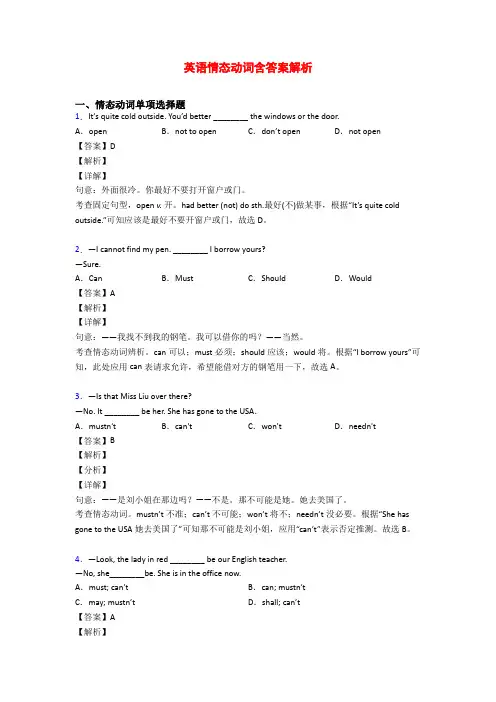
英语情态动词含答案解析一、情态动词单项选择题1.It’s quite cold outside. You’d better ________ the windows or the door.A.open B.not to open C.don’t open D.not open【答案】D【解析】【详解】句意:外面很冷。
你最好不要打开窗户或门。
考查固定句型,open v. 开。
had better (not) do sth.最好(不)做某事,根据“It’s quite cold outsi de.”可知应该是最好不要开窗户或门,故选D。
2.—I cannot find my pen. ________ I borrow yours?—Sure.A.Can B.Must C.Should D.Would【答案】A【解析】【详解】句意:——我找不到我的钢笔。
我可以借你的吗?——当然。
考查情态动词辨析。
can可以;must必须;should应该;would将。
根据“I borrow yours”可知,此处应用can表请求允许,希望能借对方的钢笔用一下,故选A。
3.—Is that Miss Liu over there?—No. It ________ be her. She has gone to the USA.A.mustn't B.can't C.won't D.needn't【答案】B【解析】【分析】【详解】句意:——是刘小姐在那边吗?——不是。
那不可能是她。
她去美国了。
考查情态动词。
mustn’t不准;can’t不可能;won’t将不;needn’t没必要。
根据“She has gone to the USA她去美国了”可知那不可能是刘小姐,应用“can’t”表示否定推测。
故选B。
4.—Look, the lady in red ________ be our English teacher.—No, she________be. She is in the office now.A.must; can’t B.can; mustn'tC.may; mustn’t D.shall; can’t【答案】A【解析】【详解】句意:——看,穿红衣服的那位女士一定是我们的英语老师。
英语情态动词题20套(带答案)含解析
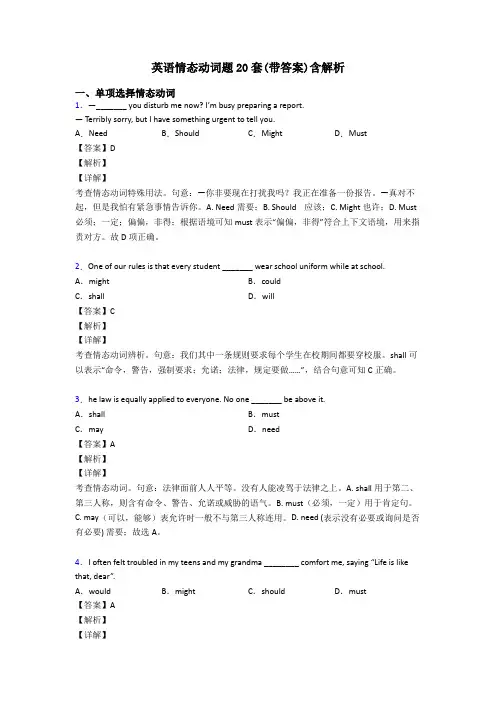
【解析】
【详解】
考查must have done结构。句意:——吉姆一定觉得我说的话很让人烦,尽管他什么也没说。——所以你是说你得向他道歉?根据“though he didn’t say anything.”可知此处表示对过去事情的肯定推测,用must have done表示“过去一定做了……”,故D项正确。
2、should作为情态动词,可以用在条件状语从句中,表示语气较强的假设,译作“万一”、“竟然”,这时也可将should置于从句之首,即将should放在主语前面,而省略从属连词if。例如:If you should fail to come, ask Mrs Chen to work in your place.(= Should you fail to come, ask Mrs Chen to work in your place.)
A.mayB.canC.mustD.ould
【答案】C
【解析】
【详解】
考查情态动词表猜测的用法。句意:一定是汤姆把车停在这儿的,因为他是唯一有车的人。A. may可能;B. can可能;C. must一定;D. should应该。由as he is the only one with a car.可知一定是他把车停在这里的,非常有把握的肯定推测,故选C。
2.One of our rules is that every student _______ wear school uniform while at school.
A.mightB.could
C.shallD.will
【答案】C
【解析】
【详解】
考查情态动词辨析。句意:我们其中一条规则要求每个学生在校期间都要穿校服。shall可以表示“命令,警告,强制要求;允诺;法律,规定要做……”,结合句意可知C正确。
高中英语情态动词形式练习题40题含答案解析
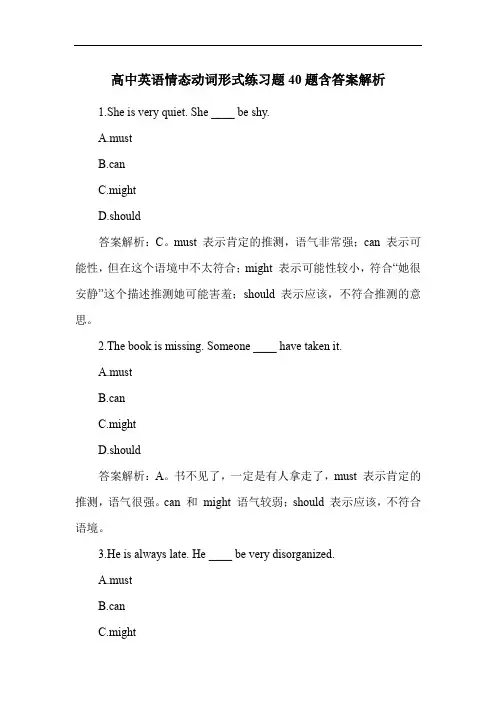
高中英语情态动词形式练习题40题含答案解析1.She is very quiet. She ____ be shy.A.mustB.canC.mightD.should答案解析:C。
must 表示肯定的推测,语气非常强;can 表示可能性,但在这个语境中不太符合;might 表示可能性较小,符合“她很安静”这个描述推测她可能害羞;should 表示应该,不符合推测的意思。
2.The book is missing. Someone ____ have taken it.A.mustB.canC.mightD.should答案解析:A。
书不见了,一定是有人拿走了,must 表示肯定的推测,语气很强。
can 和might 语气较弱;should 表示应该,不符合语境。
3.He is always late. He ____ be very disorganized.A.mustB.canC.might答案解析:A。
他总是迟到,肯定是非常没有条理,must 表示肯定的推测,语气强。
can 和might 可能性较小;should 表示应该,不合适。
4.The lights are on. Someone ____ be at home.A.mustB.canC.mightD.should答案解析:A。
灯亮着,肯定有人在家,must 表示肯定的推测,语气强。
can 和might 可能性较小;should 表示应该,不符合语境。
5.The test was very difficult. She ____ have passed it.A.mustB.canC.mightD.should答案解析:C。
考试很难,她可能通过了,might 表示可能性较小。
must 语气太强;can 表示可能性,但不太符合这个语境;should 表示应该,不符合推测的意思。
6.He looks very tired. He ____ have worked hard.A.mustB.canD.should答案解析:A。
(完整版)情态动词专项练习(含答案)
(完整版)情态动词专项练习(含答案)1. I promised to get there before 5 o’clock, but now the rain is pouring down. They ______ for me impatiently.A. may waitB. ought to waitC. could waitD. must be waiting2. He was very brave. Even though she’d hurt her leg, she ________ go back alone.A. couldB. mightC. have toD. was able to3. You ________ pay too much attention to your reading skill, as it is so important.A. cannotB. shouldC. mustD. needn’t4. I’ve tried several times, but the car just _______.A. doesn’t startB. wouldn’t startC. won’t startD. didn’t start5. Always the old lady ______ sit for hours doing nothing at all.A. was used toB. wouldC. used toD. should6. There used to be a small school,___________?A. was thereB. wasn’t itC. usedn’t thereD. usedn’t it7. Our house is on the top of the hill, so in summer the wind _____ be pretty cold.A. mustB. canC. ought toD. need8. Haven’t I told you that you __________ have the ans wer tomorrow morning?A. willB. shallC. shouldD. would9. I’m surprised that he _______ in the match.A. should failB. should have failedC. would have failedD. may have failed10. Better go to see my sick colleague right now, ________I?A. hadn’tB. didn’tC. don’tD. won’t11. Sir, you ______ be hunting deer here, for they are preserved by the government.A. oughtn’t toB. can’tC. won’tD. needn’t12. Sorry I’m late. I ______ have turned off the alarm clock and gone back to sleep again.A. mightB. shouldC. canD. will13. —There were already five people in the car, but they managed to take me as well.— It __________ a comfortable journey.A. can’tB. shouldn’t beC. must have beenD. couldn’t have been14. To be on the safe side, we should fill up the tank now, because we ______ run out of gas on the way.A. canB. wouldC. mightD. should15. ____ three people who travel together, there _____ be at least one who ____ be my teacher.A. Between; can; willB. In; should; couldC. Among; will; mayD. Of; must; can16. —Could you lend me that book you ______ me aboutwhen I telephoned you?—No, I am sorry, I can’t. I gave it to a friend.A. were tellingB. would tellC. had toldD. had been telling17. —We need a person badly to think up such an idea.—_______ the new comer have a try?A. ShallB. MayC. ShouldD. Need18. We ________ so tired. We’ve only been to a party.A. mustn’t have feltB. wouldn’t have feltC. shouldn’t have feltD. couldn’t have felt19. Professor Smith, many students want to see you. __________ they wait here or outside?A. DoB. ShallC. WillD. Would20. —How about paying a visit to Mr. Richardson, our former history teacher?—Good idea. I will e-mail him today so he _____know _________ to expect us.A. shall; whyB. may; whenC. would; whyD. will; how21. —I went to work on foot yesterday, though it _________ cats and dogs.—You __________ by bus. It was likely to get a cold.A. is raining; must have goneB. rained; would goC. was mining; should have goneD. have rained; could have gone22. You ______ pay too much attention to your reading skill, as it is so important.A. cannotB. shouldC. mustD. needn’t23. I told Sally to fix him up with this job, but perhaps I _________ it out for her.A. had to writeB. must have writtenC. should have writtenD. ought to write24. My sister met him at the Grand Theatre yesterday afternoon, so he ________ your lecture.A. couldn’t have attendedB. needn’t have attendedC. mustn’t have attendedD. shouldn’t have attended25. Research findings show we spend about two hours dreaming every night, no matter what we ________ during the day.A. should have doneB. would have doneC. may have doneD. must have done26. —Is there any flight to Tokyo today?— I think there _____, for the weather is too bad.A. mustn’t beB. mightn’t beC. needn’t beD. can’t be27. —I’m told that John had another car accident this morning.— I believe not. He _____ so careless.A. shouldn’t have beenB. wouldn’t have beenC. couldn’t have beenD. mustn’t have be en28. It was playing computer games that cost the boy a lot of time that he __________ doing his lessons.A. might have spentB. ought to have spentC. must have spentD. could have spent29. —I didn’t know you were good friends.—You _______. I have known her since she moved here. You were studying abroad then.A. may haveB. needn’t haveC. couldn’t haveD. must have30. They must have finished the work by the end of last month, __________?A. mustn’t theyB. haven’t theyC. hadn’t theyD. didn’t they31. —I didn’t see her yesterday.— Of course, you _____, because he had gone for a trip.A. can’tB. may not haveC. can’t haveD. mustn’t have32. You ________ phone him if you want to, but you _________. He is sure to phone you.A. may; mustn’tB. have t o; needn’tC. can; doesn’t needD. can; needn’t33. — She must have gone back to the valley.— ______, she _____ have. The entrance to it was nowhere to be found.A. No; mustn’tB. Yes; mightC. Yes; couldD. No; couldn’t34. He _____ full marks, but he was so careless as to make a spelling mistake.A. must have gainedB. can have gainedC. could have gainedD. must gain35. From what you said, she _____ you about it.A. mustn’t have toldB. can’t have toldC. mustn’t tellD. can’t tell36. — You ought to have made an apology to Tom yesterday evening.— Yes, I know I _________.A. ought toB. have toC. should haveD. must have37. —Is there a fog in the evening?—There _______ be. I’ll make a phone call to find it out.A. mustB. wouldC. willD. might38. — _______ he help you with the problem?—Well, though it is very hard, __________ I’ll do what I can to work it out.A. Shall; butB. Can; andC. Must; howeverD. Will; still39. —How is that, Joan?—Yeah, it’s from the boss. She _________ first, whether she likes it.A. shall goB. ought to have goneC. should goD. must have gone40. —Would you like to watch the video, in which you can see foreigners making jiaoji during the Spring Festival?—Sure, it ______ be very interesting.A. shouldB. mayC. canD. will41. —The door was open.—It _________ open. I had locked it myself and the key was in my pocket.A. can not beB. must not beC. can not have beenD. must not have been42. —Where ________ Margaret have put the empty bottles?—She ________ them away. They must be somewhere.A. can; can’t have thrownB. must; needn’tC. must; must have thrownD. cant; must throw43. —Mum, I climbed to get the Teddy Bear from the top of the shelf.—My goodness! You _______ yourself. You ______ do that next time.A. mu st have hurt; mustn’tB. should have hurt; can’tC. may have hurt; mustn’tD. might have hurt; won’t be able to44. —Shall I go and buy more food and drinks for the party?—No, we have prepared a fridge of those. That _______ be quite enough.A. canB. mayC. mightD. ought to45. —Hurry up, Michael! It’s ten to three.—Goodness me! The class_______. I’ll be late again.A. must beginB. may beginC. should have begunD. must have begun46. When he was there, he ____ go to that coffee shop at the street comer after work every day.A. wouldB. shouldC. had betterD. might47. —I hear you have written a novel.—Yes, the book ________ be out in a month or so.A. canB. dareC. shouldD. need48. —How could I thank you enough?—Don’t mention it. Any other man _________ that.A. must doB. could doC. would have doneD. should have done49. —Why aren’t they here yet?—They ________ the bus.A. can have missedB. must be late forC. may have missedD. might be late for50. Mike _______ come to see me I don’t want to go out in case he comes.A. canB. mustC. mayD. will51. The thief ________ in from the kitchen window as the door was closed.A. may climbB. must have climbedC. could have climbedD. should have climbed52. —You didn’t invite Bill?— __________ him too?A. Must I inviteB. Must I have invitedC. Should I inviteD. Should I have invited53. —Why didn’t you attend the lecture yesterday?—I didn’t think that we _______ on Sundays.A. shouldB. ought to haveC. shouldn’t haveD. will have to54. It’s said that there are plenty of hotels in that town. There ______ be any difficulty for you to find somewhere to stay.A. wouldn’tB. mustn’tC. shouldn’tD. needn’t55. —Would you be here to attend the English party this evening?—Yes, we _________.A. shallB. wouldC. willD. must56. On Sundays when I was a child, Father and I _______ get up early and go fishing.A. couldB. wouldC. mightD. should57. —You’d better keep quiet in class.—Sometimes I ________ Yesterday, I was very quiet during my English class.A. wouldB. doC. didD. have58. I lived with my sister this summer and didn’t have to pay rent. So I ______ save most of my salary.A. couldB. wouldC. was able toD. should59. —Look, John’s fallen asleep.— Oh, he _______ too late last night.A. might sit upB. should have sat upC. could sit upD. must have sat up60. —I posted the letter a week ago.—Then they __________ the letter by now. It usually takes four days.A. can have receivedB. must receiveC. should receiveD. ought to have received61. He used to teach in that university and I _________ ride past it on my way to work.A. wouldB. couldC. shouldD. might62. —So you have to leave now.—Yes, I __________.—How nice it would be if you could stay a bit longer!A. have toB. ought toC. doD. have63. He _______ Shanghai, for I saw him talking with the headmaster a moment ago.A. must have gone toB. can’t have gone toC. mustn’t have been toD. can’t have been to64. From what I learn about their hotel, the service and the weather, they _____ their holiday very much.A. wouldn’t have enjoyedB. shouldn’t have enjoyedC. needn’t have enjoyedD. can’t have enjoyed65. It is not like Jack to be unfriendly, so he _________ you when you called.A. can’t have seenB. should not have seenC. must not have seenD. need not have seen66. —Many people in England love to give advice on weather reporting.—Yes, but I think the weather office’s computers _________ be more accurate.A. canB. mustC. ought toD. might67. —The farmers lived near the high way.—________ very noisy.A. It must have beenB. They must beC. That might beD. There must be68. She is too slow. She ________ pass the test, but she __________ too little.A. would; knewB. will; knowsC. would; knowsD. will; knew69. —Mary didn’t turn up last time, did she?—No. She_________. We had changed our plan.A. shouldn’t have comeB. needn’t have to comeC. didn’t need to comeD. needn’t have come70. —They haven’t finished the work up to now.—Well, they________.A. shouldB. should haveC. wouldD. must have71. —Shall I go and buy more fruit for the party?—No, I have already bought 3 baskets. That _________ be enough.A. canB. ought toC. mayD. might72. —Why hasn’t the speaker turned up?—He _________ the flight. I’ll find it out at once.A. must have missedB. might have missedC. would have missedD. could have missed73. I _______ pay Tom a visit, but I am not sure whether I will have time this Sunday.A. shouldB. mightC. wouldD. could74. —Who is the girl standing over there?— Well, if you _____ know, her name is Mabel.A. mayB. canC. mustD. shall75. It has been announced that candidates (考生)________ remain in their seats until all the papers have been collected.A. canB. willC. mayD. shall【答案解析】1.D。
英语情态动词含答案解析
英语情态动词含答案解析一、情态动词单项选择题1.—What are you going to do tomorrow?—I’m not sure. I ________ make a trip to Hangzhou with my girl friend.A.may B.can C.will D.must【答案】A【解析】【详解】句意:——你明天打算做什么?——我不确定。
我可能和我的女朋友去杭州旅行。
考查情态动词。
may可能;can能;will将要;must必须。
由“I’m not sure.”我不确定,可知这里表示“可能去旅行”,用may表示“可能性”的推测。
故选A。
2.—I cannot find my pen. ________ I borrow yours?—Sure.A.Can B.Must C.Should D.Would【答案】A【解析】【详解】句意:——我找不到我的钢笔。
我可以借你的吗?——当然。
考查情态动词辨析。
can可以;must必须;should应该;would将。
根据“I borrow yours”可知,此处应用can表请求允许,希望能借对方的钢笔用一下,故选A。
3.—We’ve got everything ready for the picnic.—Do you mean I ________ bring anything with me?A.can’t B.needn’t C.couldn’t D.mustn’t【答案】B【解析】【详解】句意:——我们已经为野餐做好了一切准备。
——你的意思是我不需要带任何东西吗?考查情态动词。
can’t不能;needn’t不需要;couldn’t不能;mustn’t不允许。
根据上句说已经准备好了一切,可推测说话者的意思是不需要带任何东西了。
故选B。
4.Our teacher often suggests we ________ on both sides of the paper.A.write B.writes C.writing D.to write【答案】A【解析】【详解】句意:我们老师经常建议我们在纸的两面写字。
英语情态动词专项习题及答案解析
英语情态动词专项习题及答案解析一、单项选择情态动词1.—________ the woman with the baby come over? We have a seat here.—Thank you, sir. Actually I do have my seat here. But my baby likes to look out of the window. A.Would B.ShallC.Must D.May【答案】A【解析】【详解】考查情态动词。
句意:——那位抱小孩的女士,要不来这边吧?这儿有个座位。
——谢谢,实际上我有座位的,只是我的孩子喜欢看窗外。
would表示婉转的请求,征求对方的意见,Shall提问一般只用于第一人称,我们常说Shall I.或者 Shall we;may表示请求对方允许。
故选A。
【点睛】would的用法1.would 最常见的用法是:相对于一个过去时间点的后来“将要”做什么,比如:He said he would meet me at the station. 他说他会在车站接我的。
这句中的 would meet 是相对于 said (过去说)之后要做的事情。
又如:She thought she would have to ask someone for help. 她当时想,她得找个人帮忙。
2.—I feel a little nervous.—Take it easy. You __________ have difficulty passing the exam when you have prepared for it well.A.mustn’t B.needn’t C.may not D.shouldn’t【答案】D【解析】【详解】考查情态动词。
句意:——我觉得有点紧张。
——不要着急。
当你准备充分时,通过考试应该不会有困难。
A. mustn’t禁止,不允许;B. needn’t不必;C. may not可能不会;D. shouldn’t不应该。
情态动词专项练习题及答案
情态动词专项练习题及答案一、初中英语情态动词1.— I take the magazine out of the reading room?— I'm sorry you .A. Could; couldn'tB. Must; couldn'tC. Will; can'tD. May; can't【答案】 D【解析】【分析】句意:——我可以把杂志带出阅览室吗?——对不起,你不能。
could 能,可以;must必须;will将;may可以;can能,可以,can't不可以,不能。
此处表示请求许可,用could或者may,由could或者may构成的一般疑问句,肯定回答用yes,主语+can,否定回答用sorry,主语+can't,结合选项,故答案选D。
【点评】考查情态动词的辨析。
注意理解句意,理解选项,根据语境,选出正确的答案。
2.— Shall I book some seats for the concert?—______. I've done that.A. Yes, you mayB. No, you mustn'tC. No, you needn'tD. No, you can't【答案】C【解析】【分析】Yes, you may是的,你可以;No, you mustn't 不,你千万不要;No, you needn't不,你不必;No, you can't不,你不能。
句意:我要预定一些音乐会的座位吗?根据下文,我已经办了。
可知选C最符合语境。
【点评】考查交际用语3.— _________ I take my cousin Shirley with us, Mr. Wu?— Yes, but we'll get there by bike. ____________ she ride a bike?— Yes, and she ___________ ride a bike when she was only six years old.A. Could; can; couldB. Can; can; canC. Can; could; couldD. Could; could; can【答案】 A【解析】【分析】句意:-我能带我表弟雪莉和我们一起吗,吴先生?-是的,但我们将骑自行车去那儿。
- 1、下载文档前请自行甄别文档内容的完整性,平台不提供额外的编辑、内容补充、找答案等附加服务。
- 2、"仅部分预览"的文档,不可在线预览部分如存在完整性等问题,可反馈申请退款(可完整预览的文档不适用该条件!)。
- 3、如文档侵犯您的权益,请联系客服反馈,我们会尽快为您处理(人工客服工作时间:9:00-18:30)。
考查Shall的用法。句意:贝克先生,有些学生想见你。他们是在这里等还是在外面等?Shall用于第一、第三人称疑问句中,表示说话人征求对方的意见或向对方请示。故选C。
【点睛】
Shall的用法
Shall作为助动词,一般用于第一人称Ⅰ和We,表示一个将来的动作,构成将来时态。Shall后面接动词原形。例如:
3.Using AI,many companies are now conducting experiments that__________ possible just a few years ago.
A.would have beenB.might have been
C.shouldn't have beenD.couldn't have been
2. Shall用于第一、第三人称疑问句中,表示说话人征求对方的意见或向对方请示。如:Shall we begin our lesson?When shall he be able to leave the hospital?
3. Shall用于第二、第三人称,表示说话人给对方命令、警告、允诺或威胁。如:You shall fail if you don't work harder.(警告)
【答案】B
【解析】
【详解】
考查情态动词。句意:看!你的作文里有那么多的错误。你本应该把所有的注意力都集中在它上面的。表示“本应该做但实际上没有做”应该用should have done结构,can have done表示可能;need表示需要;might have done表示可能做过某事;故选B。
2.Keep up your spirits even if you _____ fail hundreds of times.
A.mustB.need
C.mayD.should
【答案】C
【解析】
【详解】
考查情态动词。A. must必须;B. need需要;C. may可能,或许;D. should应该。句意:即使失败了几百次,也要振作起来。此处表示一种不确定的推测,故选C。
7.—It’s really great to have a computer to store my photos.
—Don’t count on it too much. It ________ break down and you’d better make a copy of them.
A.mustB.can
C.shouldD.will
【答案】B
【解析】
【详解】
考查情态动词。句意:——有一台计算机来储存照片真是太棒了。——不要过度依赖它。它有时候也会出故障,你最好做一个备份。计算机出故障这是可能的事情,表示客观可能性用can。must肯定,必须;should应该;will表意愿。故B选项正确。
8.One of our rules is that every student _______ wear school uniform while at school.
(1)I shall think it over and Let you know my idea.我将考虑一下此事,然后告诉你我的想法。
(2)We shall have a good time in the park.我们在公园里会玩得很高兴的。常考的特殊用法
1. Shall用于第一人称,表示征求对方的意愿。如:What shall we do this evening?
A.shouldB.could
C.wouldD.might
【答案】C
【解析】
【详解】
考查情态动词。句意:安说无论什么时候她父亲不高兴的时候,他就会出去买些东西,通常是一些又大又没用的东西。A. should应该;B. could能;C. would总是,愿意;D. might可能。此处表示过去经常习惯做某事,故选C。
He shall have the book when I finish reading.(允诺)
He shall be punished.(威胁)
5.Ann said whenever her father was unhappy he ________ go out and buy something, usually something large and useless.
最新情态动词专项练习及答案详解
一、单项选择情态动词
1.Look! There are so many mistakes in your composition. You ________ have fixed full attention on it.
A.canB.should
C.needD.might
6.---Hi, Johnson, any idea where Susan is?
---It is class time, so she __________ in the classroom now.
A.can beB.must have been
C.might have beenD.should be
【答案】D
【解析】
【详解】
考查情态动词表推测。句意:很多公司现在使用人工智能进行试验,这在几年前是不可能的。根据“a few years ago”可知,此处表示“过去不可能”,应该用couldn’t have done,故D项正确。
4.Mr. Baker, some students want to see you. ______ they wait here or outside?
【答案】D
【解析】
考查情态动词的用法。A. can be可能,可以是;B. must have been一定(对过去事实肯定的推测);C. might have been可能(对过去事实肯定的推测);D. should be应该是。句意:—知道苏珊在哪里吗?—现在是上课时间,她应该在教室里。故答案选D。
A.mightB.could
C.shallD.will
